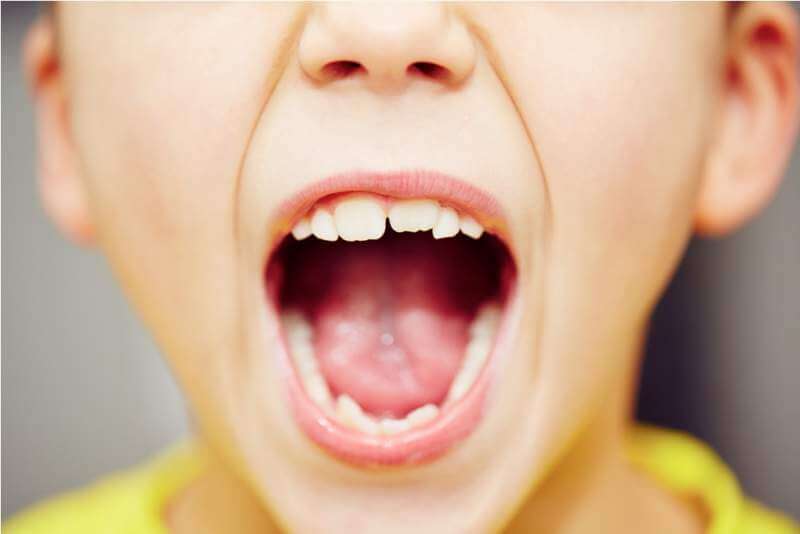It is a common myth amongst the parents of young children that milk teeth are temporary and they are going to be replaced by permanent teeth soon, so they require ‘No Special Care’. However, milk teeth play a very important role as the stepping stone towards achieving the ultimate Oral Health of a child, and they deserve as much attention as a young child’s diet and vaccinations. Early childhood Caries is one of the most frequently encountered problems in children affecting 3 – 45% of the pre-school population worldwide.
Early Childhood Caries (ECC) is the most common chronic disease condition in childhood & involves the presence of one or more decayed, missing or filled teeth in children under 72 months of age (American Academy of Pediatric Dentistry, 2010). It is also known as Baby Bottle Caries, Baby Bottle Tooth Decay, Nursing Bottle Syndrome; however, today the new name for Early Childhood Caries is ‘Maternally-derived Streptococcus Mutans Disease (MDSMD)’. It is a multi-factorial transmissible & infectious disease and usually begins with the upper front milk teeth. With proper intervention at the right time, the disease is preventable.
The milk teeth are critical for chewing properly and for speaking those precious early words. Milk teeth also hold space for the permanent teeth that will follow. The onset and progress of ECC in young children is rapid and destructive. The cavities thus produced are extremely painful for the little mouths. We go to great lengths to keep our children from experiencing injury and pain. Proper care for the milk teeth and regular dental visits from the age of 12 months can save your precious one from excruciating pain.
If a milk tooth is lost before the permanent tooth is ready to erupt, the teeth next to the empty space may shift into that space and lead to crooked teeth and an eventual need for long term treatment like braces.
Pediatric Dentists fully understand that the Baby Bottle Tooth Decay is caused amongst infants who use a Nursing Bottle containing milk or juice as a pacifier where the milk or juice pools around the teeth to initiate the process of decay. During sleep, the salivary flow is diminished and the swallowing reflex is absent, hence the pooling of fluids around the teeth creates the most conducive environment to cause Tooth Decay. If your child is in the habit of going to bed with a sweetened drink, you can reduce the risk of decay by diluting the drink with water over a course of two to three weeks. Once the three weeks have ended, switch to water.
How to Avoid Cavities?
 Be careful of your Habits:
Be careful of your Habits:
The horizontal transmission of infection between other members of a family also occur. Decay can be caused by bacteria that are passed to the baby on a spoon or pacifier. At one point or another, most parents have hastily cleaned a pacifier or spoon by putting it in their own mouth before passing it to the baby. That is a surefire way to transfer bacteria to a baby’s mouth. The decay is characterized by the bacteria ‘Streptococcus Mutans’ and is also transmitted if the infants or toddlers are kissed on the mouth by infected mothers or maid servants. If the parents are too busy coping with their own responsibilities, the child neglect usually results in this disease. It has also been seen that working mothers tend to ignore breast-feeding and resort to using the bottles as the pacifiers resulting in the disease.
Inadequate amount of Fluoride:
Decay can also result if an infant or toddler does not get an adequate supply of fluoride. A key ingredient in toothpaste, fluoride helps prevent tooth decay by strengthening the tooth’s ability to resist acid attacks from plaque bacteria and sugars that accumulate in the mouth. Fluoride can also help to reverse early decay.
Tit-Bit treats should be avoided:
Pay attention not only to what your child eats, but when he or she eats as well. Foods that are consumed during a meal do less harm than snacks eaten throughout the day. This is because the mouth produces more saliva during a meal than during a snack. Saliva washes food from the mouth and reduces the impact that acids have on the teeth, thereby reducing the risk of decay and cavities. By limiting the snacks your child eats between meals, you’ll promote healthy teeth and gums. When your child wants to snack, choose fruits or vegetables and avoid sugary foods and drinks as much as possible.
Ensure Healthy Milk Teeth:
Taking proper care of your child’s milk teeth is critical for preventing decay, cavities and pain in the short term and for providing a solid and healthy foundation for your child’s permanent teeth. Healthy milk teeth also enable your child to chew and speak properly and to smile a confident smile.
What kind of care do milk teeth need? Here are the “Do’s” of dental care for young children.
- Clean your infant’s gums with a clean gauze pad or a washed cloth after a feeding.
- Gentle brushing with a tiny amount (a dab no bigger than a grain of rice) of non-fluoride toothpaste is required for children under the age of three years.
- Once your child turns three, a pea-sized dab of fluoride toothpaste can be used when brushing. Your child should be taught to spit the toothpaste out, rather than swallow it.
- Visits to the dentist should begin as soon as the first tooth erupts in the child’s mouth.
- Assist your children with brushing and flossing until they are able to do so independently, typically around the age of eight.
The list of dental “don’ts” should also be respected by parents to keep their child’s teeth healthy.
- Do not allow your child to use a spoon or a pacifier (dummy) that could be carrying bacteria from another person. On similar account, never allow anyone to kiss on your child’s mouth.
- A child should not be given a pacifier that has been dipped in sugar, honey or sweetened liquids. Sweetened drinks can cause decay, so limit the amount of these drinks in your child’s diet.
- A child should not be put to bed with a bottle.
When a proper oral healthcare routine is not established for a young child and the “no-no’s” are ignored, decay results.
Treatment of Early Childhood Caries
- The best treatment is prevention. The parents should be encouraged to have the infants drink from a cup rather than a bottle by the time they reach their first birthday.
No juices should be given by bottle. - Oral hygiene measures should be implemented as soon as the teeth start appearing in the mouth.
- The treatment has to start early as it not only affects the teeth but also leads to more widespread health issues such as Chewing difficulty, Malnutrition, Gastro-intestinal disorders, delayed or insufficient growth (especially in regard to height and/or weight gain), Poor speech and Low Self-esteem. The teeth of a child get completely decayed and mostly the front teeth.
- Many of the teeth can be restored by fillings which are tooth coloured and are not visible. Small cavitations are restored with Composite Resins or Glass Ionomers.
Extensive decay may require partial Root Canal Treatment followed by Crowns. Because a lot of teeth are lost early, a child may require Space Maintainers to maintain the space for permanent teeth to erupt at the right place.
HIGHLIGHT
Fruit juices are often favored by children, and parents tend to believe that they are good for their kids. A 12-ounce (around 350 ml) serving of grape juice, for example, can contain over 58 grams of sugar. (One teaspoon of granulated sugar equals four grams of sugar.) If you want to give your child fruit juice, mix it with water (half water, half juice) to reduce your child’s sugar intake. Red apples can contain up to 20 grams of sugar. Milk offers another surprise. It can have as many as 12 grams of sugar per serving. And be mindful of the amount of sugar present in breakfast cereals and cereal bars. Even those healthy-sounding cereals – the ones that boast about the content of wheat, oats or fiber – can be full of sugar.
